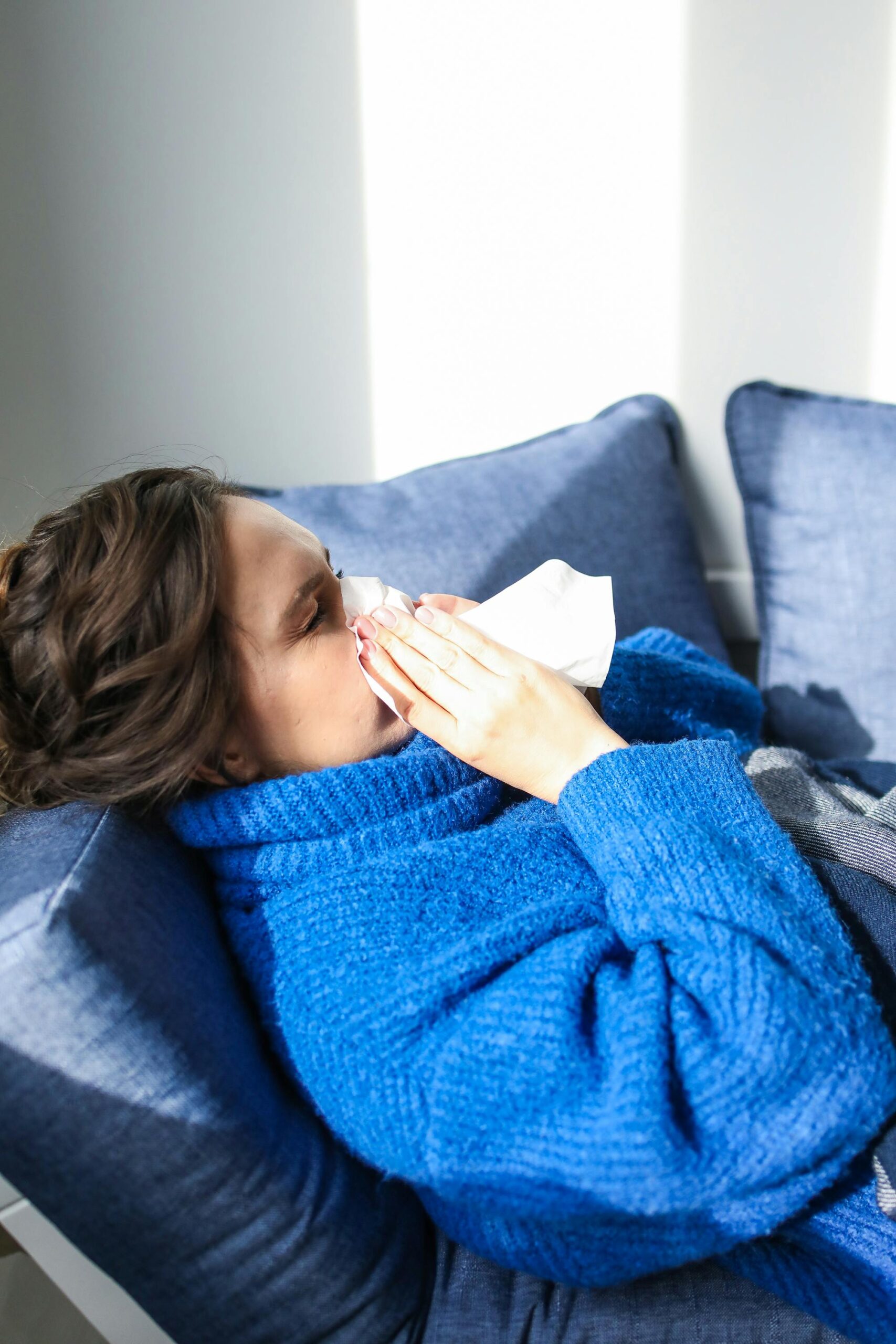As winter settles in, many of us find ourselves grappling with more than just colder temperatures. The season brings a shift in mood and energy, casting a shadow that we commonly refer to as the “winter blues”, Seasonal Depression, or Seasonal Affective Disorder, aptly named SAD.
The shorter, colder, darker days can leave us with a sense of sadness and fatigue. But winter shouldn’t be a season of dread; it can be an opportunity to prioritize your physical and mental wellbeing, explore new hobbies, and enjoy cozy moments.
In this article, we’ll outline practical ways to use nutrition, lifestyle, and supplement interventions to ease seasonal affective disorder.
What are the “winter blues”?
The increase in fatigue and a sense of melancholy during winter is often referred to as the “winter blues”, seasonal affective disorder (SAD), or seasonal depression. SAD can be attributed to various factors intricately tied to seasonal changes. The most prominent contributor is the reduction in natural daylight.
Exposure to sunlight plays a crucial role in regulating our internal body clock, or circadian rhythm, influencing the production of neurotransmitters such as serotonin and melatonin. The decline in sunlight exposure disrupts this delicate balance, impacting mood and energy levels.
In short, SAD or the winter blues is a type of depression triggered by seasonal changes. Most people who struggle with SAD notice feeling down during fall and winter as the days get shorter, darker and colder.
How does seasonal depression differ from depression?
SAD is a subtype of depression that coincides with the changing seasons and the reduction in natural daylight. Seasonal Depression differs from general depression in that it follows a seasonal pattern, starting and ending around the same time each year. Unlike general depression, which persists throughout the year, SAD is closely linked to reduced natural daylight during the winter months.
Symptoms of Seasonal Depression
Recognizing the Symptoms of Seasonal Depression is crucial for early intervention.
Some symptoms to be aware of include:
- Feeling sad, hopeless or worthless
- Loss of interest in activities that were once enjoyable
- Chronic fatigue
- Difficulty sleeping or oversleeping
- Impaired concentration
- Changes to weight and/or appetite (especially craving high-carb foods)
- Aches and pains
- Thoughts of self harm
If thoughts of self harm are present for you, please seek immediate mental health support.
What causes Seasonal Depression?
The exact cause of SAD remains unknown but several hypotheses suggest hormonal changes and a lack of sunlight as contributors.
One prominent theory suggests that variations in light exposure affect the production of neurotransmitters such as serotonin and melatonin. Sunlight, particularly natural daylight, is integral to the regulation of these neurotransmitters, and a reduction in sunlight during winter can disrupt their balance, contributing to depressive symptoms.
Another hypothesis revolves around the crucial role of vitamin D, as sunlight activates vitamin D in the skin. Deficiencies in vitamin D are linked to mood disorders and the seasonal decline in sunlight can impact vitamin D levels.
While hormonal changes and vitamin D deficiency are leading contenders, the multifaceted nature of Seasonal Depression suggests a complex interplay of various factors, and ongoing research aims to unravel the intricate mechanisms underlying this phenomenon.
Nutrition Recommendations for Seasonal Depression
Adopt an anti-inflammatory diet.
An anti-inflammatory diet is associated with a reduced risk of all types of depression and has many other health promoting benefits. This style of eating involves a deliberate increase in the consumption of vegetables, fruits, whole grains, fish, olive oil, nuts and seeds. Focus on including a variety of different colors at each meal to support your intake of antioxidants and phytonutrients. If you have kids, it can be a fun game to see who has the most colors.
Conversely, the anti-inflammatory diet advises limiting the intake of pro-inflammatory, processed foods, simple carbohydrates, sweets, and sugar-sweetened beverages. Emphasizing nutrient-dense, whole foods and minimizing inflammatory triggers improves mental health, and resilience to help you fight seasonal depression.
Increase your omega-3 intake.
Incorporating omega-3 fatty acids into the diet is a valuable tool for alleviating Seasonal Depression. Omega-3s have anti-inflammatory properties and are known to improve both brain health and mood regulation. Rich sources of these essential fatty acids include fatty fish such as salmon, sardines, and mackerel, seaweed and algae. Additional plant-based sources of omega-3s include flaxseeds, pumpkin seeds, chia seeds, and walnuts. However, these plant-based omega-3s occur in significantly smaller amounts, so if possible, we prefer prioritizing fatty fish. Doubling down on these Omega-3-rich foods can support your brain health and enhance your mental well-being during the winter months.
Ramp up your protein consumption.
Increasing protein intake has multiple purposes if you’re struggling with SAD. Protein is required for the synthesis of neurotransmitters, including dopamine that is integral for mood regulation. Increased protein consumption also contributes to stabilized blood sugar levels, supporting sustained energy and a balanced mood.
The stabilizing effect on blood sugar is particularly relevant in the context of SAD since it helps improve energy fluctuations and mood swings associated with this condition. Additionally, the inclusion of sufficient protein in the diet can assist in curbing cravings often linked to SAD.
The best sources of protein are animal products like grass-fed/finished beef, organic pasture-raised poultry and eggs, and wild caught fish. We also like certain organic dairy products (depending on your tolerance) like full-fat yogurt, cottage cheese, kefir, and hard cheeses. Plant-based protein sources such as organic tofu, edamame, lentils, legumes, nuts and seeds can contribute to your overall protein intake, but be sure to add a variety of sources to ensure a complete and adequate intake of amino acids. We love a plant forward diet, but know that high quality animal proteins are essential for health.
Boost your B vitamins.
Prioritizing B vitamins in the diet can help address SAD since they are essential nutrients for producing serotonin. Serotonin is a neurotransmitter associated with mood regulation and relies on adequate B vitamin levels for its synthesis.
Food sources rich in B vitamins include meat, poultry, fish, eggs, dairy products, nuts, seeds, beans, dark green leafy vegetables, and whole grains. By incorporating these nutrient-dense foods into your diet, you can provide the necessary building blocks to ensure a sufficient supply of serotonin, contributing to a more resilient and balanced mental state, particularly in the context of seasonal mood fluctuations.
Keep in mind that certain individuals cannot get adequate B vitamins from the diet alone and require supplementation. For example, people with the MTHFR gene mutation, people taking certain medications that deplete B vitamins, those with dietary restrictions, and others may need a supplemental boost of B vitamins. Depending on your situation, we may use testing to determine your nutrient deficiencies and then we’ll help you choose the correct type of B vitamins for your body. For instance, those with the MTHFR gene mutation will require methylated B vitamins to ensure proper absorption.
B vitamins are essential for mood regulation and if you’re not eating enough, we’ll educate you on how to boost your intake. If your circumstances indicate a B vitamin deficiency, we’ll run tests and help you find the right supplement to fill the gaps.
Lifestyle Recommendations for Seasonal Depression
Light Therapy
Light therapy can be a very powerful tool for preventing seasonal affective disorder and easing the associated symptoms. Invest in a lightbox or an alarm clock that uses gradual light exposure to wake you up and kickstart your circadian rhythm without the jarring sounds. We love the Happy Light because it uses full spectrum, 10,000 lux light and comes in many affordable styles. We recommend turning it on within 30 minutes of waking up and keeping it in your peripheral vision while you go about your morning routine. Bonus points – this can also help stimulate your cortisol awakening response, leading to better energy throughout the day!
Venturing outdoors early in the day can also serve as a powerful method to jumpstart your circadian rhythm since natural light positively influences your body’s internal clock.
Movement
Aim to exercise for at least 20 to 30 minutes a day. It’s okay if you break that up into shorter chunks throughout the day. That might look like a ten minute walk first thing in the morning and twenty minutes of weight training after work. Walking is a great choice if you’re not sure where to start. Bonus points for walking outside with a friend! Regular exercise promotes healthy levels of serotonin and endorphins to boost your mood. We’ve noticed that if we venture outside in the winter, even when we don’t want to, we almost always feel better.
Massage &/or Heat
Consider incorporating massages into your routine since they not only boost dopamine and serotonin, but they also contribute to lower cortisol levels (the stress hormone). Physical touch is a powerful tool for health and we find it particularly useful during the cold winter months.
We love using the sauna year-round, but it’s especially beneficial during colder months because the exposure to warmth and light increases circulation and releases endorphins that help alleviate symptoms of SAD. If possible, we prefer an infrared sauna because it penetrates the skin more deeply, allowing you to get a more intense sweat at a lower temperature and stay in the sauna longer.
You can go to a sauna at a nearby gym or spa, or even buy your own to use at home. Our favorite is the Therasage affordable home sauna, as it not only offers the convenience of home use but also utilizes infrared heat technology, making it an excellent choice for individuals seeking relief from seasonal depression in the comfort of their own space.
Community and Connection
The importance of community and connection cannot be overstated. There’s a robust amount of evidence showing us just how important connection is for our physical and mental health. It can be really hard to put yourself out there, especially when the urge to hibernate hits mid winter. Although resting is important, prioritizing time with your community is essential. Scheduling a regular lunch date, book club, or workout class can be a good way to make sure you’re regularly spending time with others. Reach out to your circle and express your desire to connect during the winter and see what happens!
Embrace Winter Activities
Lean into the activities you can only do during the winter to shift your mindset towards enjoying what the season has to offer, rather than dreading it. It doesn’t have to be a cold weather sport like skiing, ice skating or winter walks (although it could be). It could simply be embracing the extra time spent inside and trying more time consuming recipes, picking up a craft or instrument, reading a good book, or getting cozy with a new TV series.
Try Aromatherapy
Some studies show that lavender aromatherapy can have antidepressant and antianxiety benefits. Consider diffusing lavender essential oils into your space, adding a drop or two to a bath or lotion to help manage seasonal affective disorder.
Supplements for Seasonal Depression
We know we sound like a broken record, but you can’t supplement your way out of poor dietary and lifestyle decisions. But, if you’re being diligent about your diet and lifestyle and want to help fill the gaps, supplements can be a useful tool.
Supplements we might consider include:
1. Vitamin D
The research on vitamin D for seasonal depression is robust and if you’re struggling with SAD, we’ll almost always have you test your vitamin D status. We want our clients to have at least 50 ng/ml and if they don’t, we’ll use a high quality vitamin D3 supplement to boost their levels. We always supplement vitamin K2 and magnesium alongside vitamin D to help improve bioavailability and shuttle calcium into the bones instead of accumulating in the arteries.
2. Omega-3 Fatty Acids (Fish Oil)
Omega-3 fatty acids, particularly EPA (eicosapentaenoic acid) and DHA (docosahexaenoic acid), have been linked to improved mood and may have antidepressant effects. Sources include fatty fish like salmon and mackerel (also anti-inflammatory!), but supplementation can be considered in cases where dietary intake is insufficient.
3. Magnesium glycinate or threonate
Magnesium plays a role in neurotransmitter function and can have a calming effect on the nervous system. It’s involved in over 300 enzymatic reactions in the body and may help with stress management and mood regulation. Magnesium glycinate has a more systemic benefit and can be extremely helpful for mood or pain. Meanwhile, magnesium threonate crosses the blood/brain barrier and can be particularly helpful for brain fog or headaches.
4. Curcumin
Curcumin is the active compound in the spice turmeric and is well known for its anti-inflammatory properties. It has shown promising results in clinical studies for both depression and anxiety. Black pepper can help increase bioavailability of curcumin, and we recommend taking it alongside a fat-containing meal for optimal absorption.
5. Probiotic
A high quality probiotic, or at the very least, daily probiotic rich foods can support gut health and has a direct effect on brain health via the gut/brain axis. A high percentage of serotonin is made and stored in the gut, so optimizing gut health can support appropriate levels of serotonin.
6. L-Theanine
L-theanine is an amino acid found in green tea that may have relaxing and mood-stabilizing effects. It’s believed to work by increasing levels of certain neurotransmitters, including serotonin and dopamine. Drinking more green tea can increase your intake of L-theanine, but there are supplemental options if tea isn’t your thing.
7. St. John’s Wort
St. John’s Wort is a well researched herbal supplement that may be effective in treating mild to moderate depression. It should be used as an alternative to antidepressants, not in addition to antidepressants. Always consult with your primary care provider before changing any of your psychiatric medications.
Final Thoughts
It’s normal to feel more tired during the winter, but if your quality of life is impacted by feelings of sadness, a loss of interest, or other depressive symptoms, it’s time to be proactive about your mental health.
We want to extend a hand to help brighten those dark moments. We’ll use evidence-based dietary, lifestyle and supplement interventions, not just as a remedy but as a lifeline. You deserve a winter filled with warmth, both inside and out. Let’s navigate this season together.









